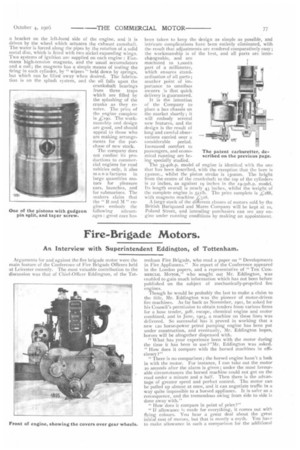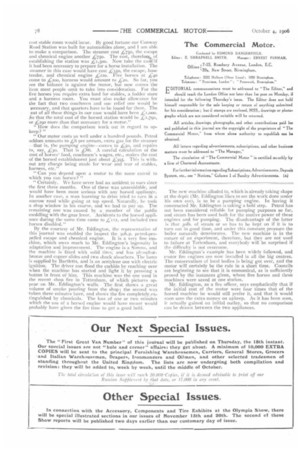Fire-Brigade Motors.
Page 5

Page 6

If you've noticed an error in this article please click here to report it so we can fix it.
An Interview with Superintendent Eddington, of Tottenham.
Arguments for and against the fire brigade motor were the main feature of the Conference of Fire Brigade Officers held at Leicester recently. The most valuable contribution to the discussion was that of Chief-Officer Eddington, of the Tot
tenhain Fire Brigade, who read a paper on "Developments in Fire Appliances," No report of the Conference appeared in the London papers, and a representative of " THE COMMERCIAL MOTOR," who sought out Mr. Eddington, was enabled to gain much information which has not been before published on the subject of mechanically-propelled fire engines. Though he would be probably the last to make a claim to the title, Mr. Eddington was the pioneer of motor-driven fire machines. As far back as November, igoi, he asked for his Council's permission to obtain tenders from various firms for a hose tender, soft. escape, chemical engine and motor combined, and in June, i9o3, a machine oil these lines was delivered. So successful has it proved in working that a new 120 horse'-poWer petrol pumping engine has been put under construction, and eventually, Mr. Eddington hopes, horses will be altogether dispensed with.
" What has your experience been with the motor during the time it has been in use?"Mr. Eddington was asked. " How does it compare with the horsed machines in efficiency?" "There is no comparison ; the horsed engine hasn't a look in with the motor. For instance, I can take out the motor to seconds after the alarm is given ; under the most favourable circumstances the horsed machine could not get on the road under a minute and a half. Then there is the advantage of greater speed and perfect control. The motor can be pulled up almost at once, and it can negotiate traffic in a way quite impossible to a horsed appliance. It is safer as a consequence, and the tremendous swing from side to side is done away with," " How does it compare in point of price?"
"If allowance is made for everything, it comes out with flying colours. You hear a great deal about the great initial cost of motors, but that is mostly a myth. You have to make allowance in such a comparison for the additional cost stable room would incur. By good fortune our Conway Road Station was built for automobiles alone, and I am able to make a comparison. The steamer cost £750, the escape and chemical engine another .4.750. The cost, therefore„ of establishing the station was .4't,soo. Now take the case if it had been necessary to prepare for a horse installation. The steamer in this case would have cost .1,;-3so, the escape, hose tender, and chemical engine £220. Five horses at 440 come to ..acto, harness would amount to Lzo, So far, you see the balance is against the Motor, but now comes the item most people omit to take into consideration. For the five horses you require extra land for stables, a fodder store and a harness room. You must also make allowance for the fact that two coachmen and one relief one would be lecessam and that quarters have to be found for them. The ;ost of all these things in our case would have been 471,000. .6o that the total cost of the horsed station would be £1,790, or 4290 more than that necessary for a motor."
" How does the comparison work out in regard to upkeep? "
" Our motor costs us well under a hundred pounds. Petrol seldom amounts to per annum, extra gas for the steamer that is, the pumping engine—cornes to £50, and repairs to, say, £30. That is A;86. A careful calculation of the cost of horses' food, coachmen's wages, etc., makes the cost of the horsed establishment just about j,;395. This is without any charge being made for wear and tear of stables, harness, etc."
" Can you depend upon a motor to the same extent to which you can horses? "
" Certainly. We have never had an accident, to ours since the first three months. One of these was unavoidable, and would have been more serious with any horsed appliance. In another ease, a man learning to drive tried to turn in a narrow road while going at top speed. Naturally, he took a shop window in his course, and we had to pay up. The remaining one was caused by a member of the public meddling with the gear lever. Accidents to the horsed appliance during the same time came to L112, and included two horses disabled."
By the courtesy of Mr. Eddington, the representative of this journal was enabled the inspect the 30h.p. petrol-pro
pelled escape and chemical, engine. It is a very fine machine, which owes much to Mr. Eddington's ingenuity in adaptation and improvement. The engine is a Simms, and the machine is fitted with solid tires; and has phasphorbronze and copper slides and two shock absorbers. The bum) is supplied by B.artletts, and is an acetylene one with electric The driver can flood the carbide by reaching over when the machine has started and light it by pressing a button in front of-him. This machine was the one used in the recent shop fire in Tottenham, of which pictures appearon Mr.. Fddington's walls.The -first shows a great volume of smoke pouring from the shop; the second was 'taken three minutes later, and shows the fire completely extinguished bychemicals. The loss of one or two minutes which the use of a horsed engine would have meant would probably have given the fire time to get a good hold. The new machine alluded to, which is already taking shape at the deka)/ (Mr. Eddington likes to see the work done under his own eve), is to be a pumping engine. In having it constructed Mr. Eddington is taking a bold step. Petrol has not been considered reliable for pumping purposes so far, and steam has -been used both for the motive power of these engines and for pumping. The disadvantage of the latter is that 3o1b. of steam or so has to be kept on if it is to turn out in good time, and under this constant pressure the boiler naturally deteriorates. The new machine is in the nature of an experiment, therefore, but they are not used to failure at Tottenham, and everybody will be surprised if the difficulty is not overcome, Mr. Eddington's example has been widely followed, and motor fire engines are now installed in all the big centres. The conservatism of focal bodies is being got over, and the motor will certainly be the rule in a short time. Councils are beginning to see that it is economical, as is sufficiently proved by the instances given, where five horses and three machines were saved at one station.
Mr. Eddington, as a fire officer, says emphatically that if the initial cost of the motor were four times that of the horsed machine he would still prefer it, and that it would soon save the extra money on upkeep. As it has been seen, it actually gained on initial outlay, so that no comparison can be drawn between the two appliances.




















